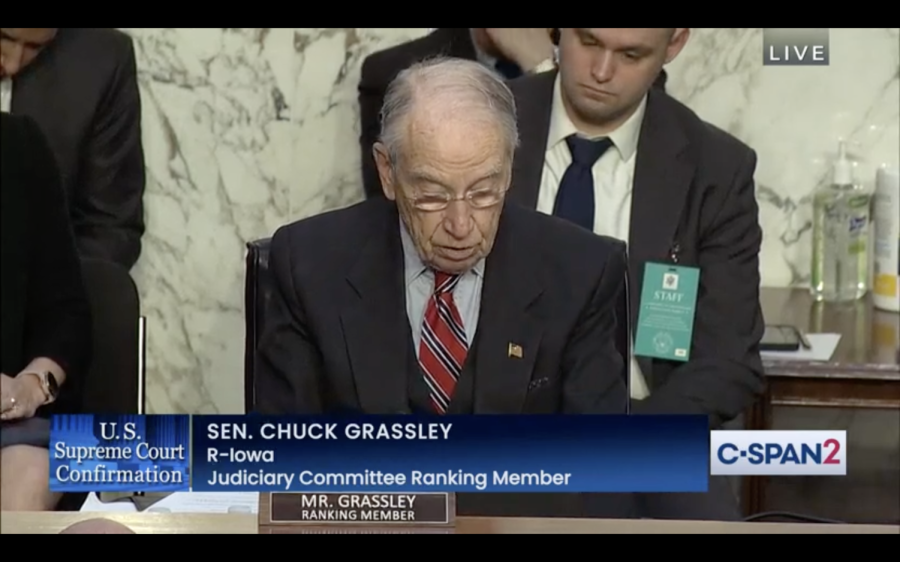Sen. Chuck Grassley will not support Ketanji Brown Jackson’s nomination to the Supreme Court
Grassley, Ranking member of the Senate Judiciary Committee, repeated concerns about Jackson’s approach to sentencing and the records available to the committee.
Sen. Chuck Grassley delivers his opening statement during a Judiciary Committee meeting considering recommendation of Ketanji Brown Jackson to the U.S. Supreme Court on Monday, April 4, 2022. (CSPAN)
April 4, 2022
WASHINGTON – Judiciary Committee Ranking Member and Sen. Chuck Grassley, R-Iowa said he will not support Judge Ketanji Brown Jackson’s nomination to the Supreme Court due to what he called fundamentally different judicial philosophies.
Grassley also said there was a lack of information available to the panel, and, continuing a common Republican talking point from the confirmation hearings, he took issue with her approach to sentencing, which he said was too lenient.
“Having carefully studied her record, unfortunately I think she and I have fundamentally different views on the role of judges,” he said. “… because of those disagreements, I can’t support her nomination.”
Continuing a common theme from his questioning of Jackson, Grassley said he wanted access to more of Jackson’s records from her time on federal courts and the sentencing commission.
Grassley also said Jackson sidestepped questions about her judicial philosophy.
When asked about her judicial philosophy during the hearings in March, Jackson said she uses a judicial methodology that involves approaching cases from a position of neutrality, assessing the documents and facts of the case, and then interpreting the law based on those facts.
“I do have a philosophy, the philosophy is my methodology,” Jackson told Grassley during her hearings on March 23. “It is a philosophy that I have developed from practice.”
Grassley said he didn’t agree with her methodology, specifically when it came to compassionate release under the First Step Act.
“She said to look at her cases to see how that methodology worked,” he said. “I did, and I found the results of that methodology alarming when Judge Jackson applied it to the First Step Act.”
Grassley said she wasn’t ready to answer questions other nominees did such as her opinion on the judicial philosophy of three sitting justices.
“It’s hard to satisfy everyone. I’ve had calls to my office complaining about Senator Durbin saying good things about me and they argue that I didn’t say enough about the Democrats’ treatment of Kavanaugh and Barrett,” he said. “And then I have Democrats who are saying I was too mean to the nominee. Throughout this process I focused on thoroughly and fairly assessing Judge Jackson’s rhetoric, I think I’ve done that.”
Senate Judiciary Committee Chair Dick Durbin, D-Illinois, said in his opening comments that Jackson is highly qualified, with a decade of experience on the bench.
“It’s the first time the committee has had the opportunity to advance the nomination for a Black woman to sit on the Supreme Court. This is a historic moment for the committee and for America.”
Durbin said most of the committee remained civil, but that there were some uncalled for attacks on Jackson’s characters throughout the 24 hours of confirmation hearings Jackson participated in last week.
“If there’s one positive take away from these attacks, it’s that the nation saw the temperament of a good, strong person ready to serve on the highest court,” he said.
The committee is voting on whether to recommend Jackson for confirmation to the Supreme Court, but a full Senate floor vote will be needed to confirm her. The committee is split evenly, with 11 Democrats and 11 Republicans, and the vote is expected to fall along party lines.
Jackson is President Joe Biden’s first Supreme Court nominee. If confirmed, she would be the first Black woman to serve on the Court.
She is set to replace Justice Stephen Breyer, who plans to retire. Jackson previously served as a law clerk for Breyer and currently serves as a judge on Washington, D.C.’s federal appellate court.
“Rather than simply another Justice Breyer, she will be the one and only Justice Ketanji Brown Jackson, and Justice Jackson will bring to the Supreme Court the highest level of skill, integrity, civility and grace,” Durbin said.
















